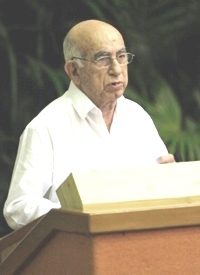
On Tuesday, Cuba announced that José Ramón Machado, 80, would fill the second highest position in the Communist Party, putting him in line to possibly succeed President Raul Castro. The New York Times notes that the announcement was significant as it was the first time since 1959 that “someone other than the Castro brothers” was selected to fill such a prominent position.
The appointment, which took place at the Communist Party’s first congress in 14 years, was among a series of considerable changes taking place in Cuba, including the alleged implementation of measures to allow for more private enterprise. The changes seem to reflect President Castro’s efforts to rejuvenate the Cuban people and pull Cuba out of its staggering economy.
Castro emphasized, however, that the measures are merely to restore Cuban socialism rather than transition to capitalism.
“I assume my post to defend, preserve and continue perfecting socialism, and never permit the return of capitalism,” declared Castro.
Just how far the measures will go is unknown, however. The New York Times writes:
Although the congress approved about 300 modifications to the law, which could include the buying and selling of homes, a practice banned since the revolution, and the eventual elimination or reduction of state subsidies like ration books for basic necessities, details were not disclosed. The National Assembly will receive the results, and it is widely expected that it will ratify them.
The reactions of the Cuban people could not be gauged out of fear of speaking openly in a country that does not permit dissent.
During Tuesday’s conference, President Castro announced that he would maintain the top position of the party, and proceeded to read off a list of leadership changes, confirming Fidel Castro’s official departure from Communist Party ranks after Fidel Castro announced that he would no longer serve as secretary of the party last month.
The announcement to appoint Machado was somewhat surprising as Castro implied on a number of occasions that he was seeking a youthful upstart to lead in the post-Castro era. Ultimately, however, Castro chose a man with whom he fought alongside during the rebellion.
Castro admitted that the administration failed to prepare the younger generation for succession, declaring Cuba lacked “a reserve of substitutes with the sufficient maturity and experience to take over the principal duties of the country.”
Others contend that there is more to it than that, and in fact that Castro fears the possibility of a youthful, progressive revolutionary movement.
Christopher Sabatini, a Cuba scholar and editor of Americas Quarterly, explains, “What it means is any generational change and the implementation of reforms will be guided by the ‘historicos’-or perhaps better put, constrained by the history of the Cuban revolution and the memories and goals of its founders.”
The New York Times reports, however, “Mr. Castro did…name several people younger than 70 to the central committee and three to the 15-member Politburo, including the architect of the current round of economic changes, possibly grooming them for bigger roles.”
While Machado’s age may preclude him from succeeding President Castro, it is believed that Machado will play a significant role in determining who that successor will be.
Arturo Lopez-Levy, a former political analyst in the Cuban Interior Ministry, indicates, “machado will be a key factor in choosing not only the successor, but also the structure of separation of powers destined to replace, within the party and between party and government, the current model of Castro in command.”
United States Representative Ileana Ros-Lehtinen (R-Fla.), who left Cuba in the 1960s, responded to Tuesday’s announcements.
“The so-called ‘congress’ of the Communist Party is anything but a Congress…The Cuban people deserve much better than these old and tired despots who refuse to accept that they have failed miserably.”
Photo: Cuba's Vice President Jose Ramon Machado Ventura speaks during the 6th Communist Party Congress in Havana, Cuba, Tuesday, April 19, 2011: AP Images



